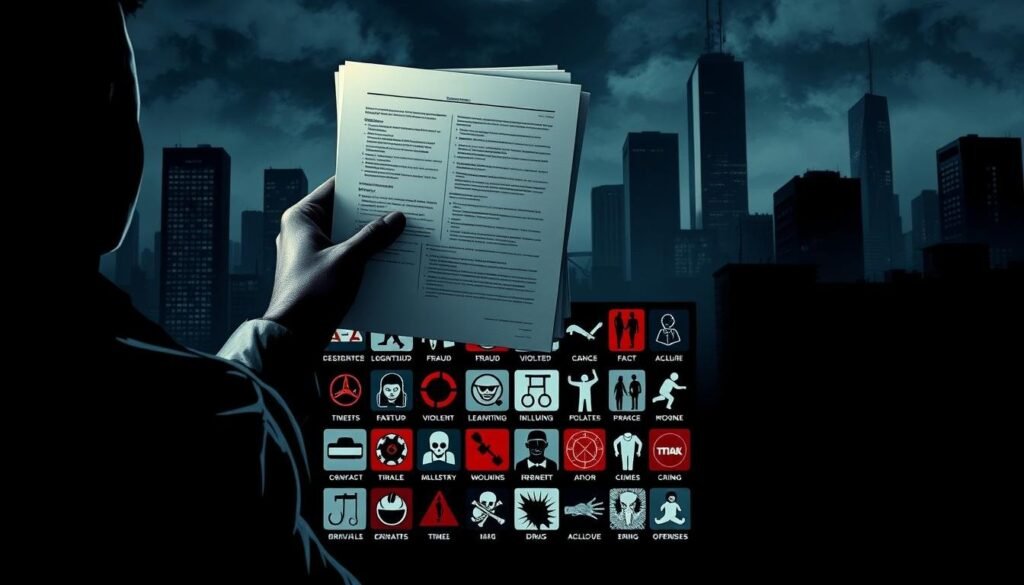Last updated on October 28th, 2025 at 03:17 pm
Concealed Carry Permits for Felons in Texas: If you live in Texas and have a felony, knowing the gun laws can be tough. The rules for concealed carry permits are especially tricky for those with a felony.
Understanding texas gun laws for felons is key. This article will cover the laws and rules for felons in Texas. It will also talk about how federal laws affect your rights.
By the end of this article, you’ll know more about the laws. You’ll also understand how to follow them. [Concealed Carry Permits for Felons in Texas]
Contents
- 1 Understanding Texas Gun Laws for Felons
- 2 Federal Firearm Laws Affecting Felons
- 3 Can a Felon Get a Concealed Carry Permit in Texas?
- 4 Types of Felonies and Their Impact on Gun Rights
- 5 Restoration of Gun Rights for Felons in Texas
- 6 Application Process After Rights Restoration
- 7 Legal Consequences of Unlawful Possession
- 8 Conclusion: Concealed Carry Permits for Felons in Texas
- 9 FAQ
- 9.1 Can a felon in Texas ever possess a firearm again?
- 9.2 What types of felonies are most likely to affect gun rights in Texas?
- 9.3 How do federal laws affect a felon’s ability to get a concealed carry permit in Texas?
- 9.4 What is the process for restoring gun rights in Texas?
- 9.5 Can a felon in Texas apply for a concealed carry permit after their gun rights are restored?
- 9.6 What are the penalties for a felon possessing a firearm unlawfully in Texas?
- 9.7 Are there any exceptions to the federal law prohibiting felons from possessing firearms?
- 9.8 How do Texas gun laws intersect with federal regulations regarding felons and firearms?
Understanding Texas Gun Laws for Felons
Felons in Texas have to deal with complex rules about guns. The state’s laws on owning guns for those with felony convictions are strict. They are shaped by both Texas and federal rules.
In Texas, people with felony convictions usually can’t own guns. This rule comes from both Texas state law and federal law. The exact rules depend on the type of felony.
Some felonies are seen as more serious. This can affect a person’s right to own guns more. It’s important to know which felonies matter most for gun rights. Also, getting gun rights back in Texas requires following specific legal steps.
Felons in Texas need to know the rules about guns. Knowing the laws helps them make smart choices. It also helps them avoid legal trouble. [Concealed Carry Permits for Felons in Texas]
Federal Firearm Laws Affecting Felons
If you’re a felon in Texas, you need to know about federal laws on guns. These laws affect your chance to get a concealed carry permit. They are made to control who can have guns, especially those with felony convictions.
Under federal law, felons can’t usually have guns. This rule is in place unless your rights are fully restored. Even if Texas lets you have guns again, federal law might still say no.
For felons in Texas, knowing about federal gun laws is key. If you want a concealed carry permit, you must understand the federal rules. Federal agencies can charge you with gun crimes if you have a felony.
It’s smart to talk to a lawyer about these laws. They can help you understand your rights and the risks of getting a concealed carry permit. This way, you can make good choices and avoid legal trouble.
Can a Felon Get a Concealed Carry Permit in Texas?
Getting a concealed carry permit in Texas is tough for those with felony records. Texas law has clear rules for these permits. But, having a felony makes it harder.
According to Texas law, felons can’t get a concealed carry permit. This is because of state and federal laws. These laws say felons can’t have guns. To qualify, you must not have been convicted of a felony.
- The nature of the felony conviction
- Whether the individual’s rights have been restored
- Compliance with Texas Department of Public Safety requirements
It’s important to know these rules to understand your rights in Texas. Even though felons usually can’t get a permit, there are exceptions. Legal processes can change things.
Types of Felonies and Their Impact on Gun Rights
The impact of a felony conviction on your gun rights depends on the type and classification of the felony. In Texas, felonies are categorized into different types based on their severity. This classification plays a significant role in determining the rights of convicted felons, especially regarding gun ownership.
Effect on Gun Ownership
Texas law categorizes felonies into five degrees, ranging from Capital Felonies, which are the most severe, to State Jail Felonies, which are less severe. [Concealed Carry Permits for Felons in Texas]
The classification of your felony conviction can affect your ability to own or possess firearms. For instance, a conviction for a Capital Felony or a First-Degree Felony may result in more stringent restrictions on gun ownership compared to a State Jail Felony.
Understanding the types of felonies and their respective classifications is crucial for individuals with felony convictions. If you’re a convicted felon, knowing how your conviction affects your gun rights can help you navigate the legal landscape more effectively.

Gun laws for convicted felons in Texas are designed to balance public safety with individual rights. While certain felony convictions may restrict your ability to possess firearms, understanding the specifics of your situation can provide clarity on your legal standing.
It’s essential to consult with a legal professional who can provide guidance based on the specifics of your case. They can help you understand your options regarding gun ownership.
Restoration of Gun Rights for Felons in Texas
Felons in Texas can get their gun rights back through a legal process. This is important for those who have finished their sentences and want to fully join society again.
The process to get gun rights back in Texas involves several steps. First, it’s essential to understand the type of felony conviction. This is because some felonies mean you can never have a gun in Texas.
To start, felons must finish all parts of their sentence, including probation or parole. Then, they can file a petition to get their gun rights back. This petition goes to the court where they were convicted.
The court looks at many things when deciding on gun rights. They consider the type of felony, the person’s criminal history, and how they’ve acted since being convicted. They want to make sure restoring gun rights won’t make the public unsafe.
It’s also key to remember that Texas law might let you have guns back, but federal law might not. So, knowing both state and federal laws is important for felons wanting to get their gun rights.
See Also: Virginia Felon Voting Ban Lawsuit Challenges Restrictions
Application Process After Rights Restoration
After your rights are restored, you can start the concealed carry permit application. This process includes gathering documents, background checks, and training.
You’ll need to collect important documents first. These are usually proof of who you are, where you live, and your citizenship. Having these ready will make things easier.
Background checks are a big part of the process. They check if you’re allowed to carry a gun. You’ll need to give fingerprints and let them check your criminal history.
You also have to take a training course approved by the Texas Department of Public Safety. This course teaches you about gun safety, when it’s okay to use deadly force, and how to carry a gun.
After you’ve finished the training and collected all your documents, you can apply. The time it takes to process your application can vary, so plan ahead. [Concealed Carry Permits for Felons in Texas]
Knowing the steps for a concealed carry permit after your rights are back can help you. For more details and the latest rules, check the Texas government website or talk to your local police.
Legal Consequences of Unlawful Possession
If you’re a convicted felon in Texas, having a gun without permission can lead to big legal problems. It’s important to know what these consequences are to make smart choices about guns.
Having a gun when you shouldn’t as a felon can mean big fines and jail time. How long you might be in jail or how much you’ll have to pay can depend on your past crimes and the details of the case.
Being caught with a gun illegally can change your life a lot. It can affect your job chances and even your freedom. Knowing these risks is key.
| Offense | Potential Fine | Potential Imprisonment |
|---|---|---|
| Unlawful Possession by Felon | Up to $10,000 | 2 to 10 years |
| Repeat Offender | Up to $20,000 | 5 to 20 years |
Knowing the severity of these penalties can help you make better choices. This way, you might avoid serious legal trouble. [Concealed Carry Permits for Felons in Texas]
Conclusion: Concealed Carry Permits for Felons in Texas
Understanding concealed carry permits as a felon in Texas can be tough. The laws aim to protect both your rights and public safety. Knowing that a felony can limit your permit is crucial.
Getting your gun rights back is important if you want to use your Second Amendment rights. You need to know the laws about felons and guns in Texas. It’s also important to know which felonies affect your rights and the legal trouble you could face.
Learning about Texas firearm laws and concealed carry for felons helps you make smart choices. If you’re a felon in Texas, knowing the laws is key. This way, you avoid legal problems.
See Also: Can Felons Apply for Federal Disaster Relief Funds?
FAQ
Can a felon in Texas ever possess a firearm again?
In Texas, a felon might regain their right to own a gun. This can happen through a pardon or by having their conviction expunged. But, it’s not automatic and comes with certain conditions.
What types of felonies are most likely to affect gun rights in Texas?
In Texas, violent felonies and those involving a firearm often limit gun rights. But, any felony can potentially stop you from owning a gun. [Concealed Carry Permits for Felons in Texas]
How do federal laws affect a felon’s ability to get a concealed carry permit in Texas?
Federal law bars felons from owning guns, even in Texas. So, even if Texas state law might allow you to regain your gun rights, federal law could still stop you.
What is the process for restoring gun rights in Texas?
To get your gun rights back in Texas, you usually need a pardon from the Texas Board of Pardons and Paroles. Or, you can have your conviction expunged or set aside by a court.
Can a felon in Texas apply for a concealed carry permit after their gun rights are restored?
If your gun rights are restored, you can apply for a concealed carry permit in Texas. But, you must still meet the requirements, like completing training and passing background checks.
What are the penalties for a felon possessing a firearm unlawfully in Texas?
Having a gun without permission in Texas can lead to big penalties. You could face up to 10 years in prison and fines. It can also bring more charges. [Concealed Carry Permits for Felons in Texas]
Are there any exceptions to the federal law prohibiting felons from possessing firearms?
There are a few exceptions, like for those with expunged convictions or pardons. But, these exceptions are rare and have strict conditions. [Concealed Carry Permits for Felons in Texas]
How do Texas gun laws intersect with federal regulations regarding felons and firearms?
Texas and federal laws both control who can own guns, including felons. If the laws conflict, the stricter one applies. So, as a felon, you must follow both state and federal rules.

Van Maldonado, born in California, holds a degree in Criminology and Police Science. Currently serving as an investigative officer at a local police station, he spends his leisure time writing insightful content for FelonScope.com.

